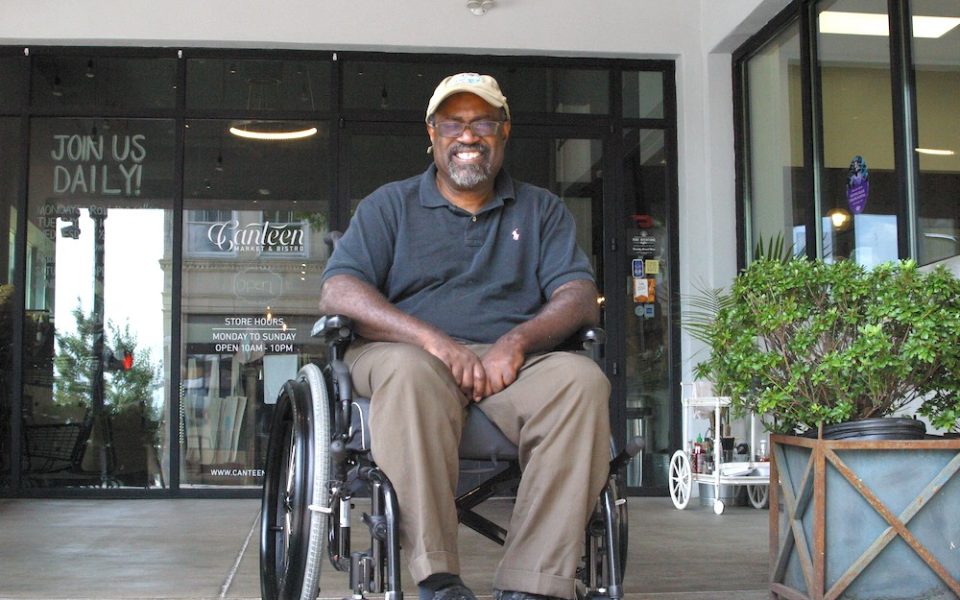If you think mobility and handicapped-accessibility issues in restaurants don’t apply to you, just wait a few years.
While people who aren’t in wheelchairs tend to have a liberal definition of “accessible,” a restaurant may describe itself as accessible because there’s only one step leading to the door, or because it has low-top tables.
“When ADA compliance, became law in 1978, North Carolina was the first state to adopt handicap code,” says Dan Dockery, chief building official for the city of Winston-Salem.
“We have to be ruthless to provide an inclusive environment. We often forget those things.”
Winston-Salem is consistently on “Best Places to Live” lists in Forbes, Time and US News & World Report.
I sat down with one of the Triad’s most colorful and social restaurant goers, Jeff “Smitty” Smith, aka Smitty of Smitty’s Notes. Smitty suffers from multiple sclerosis and uses a wheelchair to get around town.
When you go out, what restaurants do you like?
Normally, I don’t like to say which restaurants I like going to. The big thing now is Southern cuisine. What I like to call the “shrimp and grits” cuisine. The Taco Regime has been pretty good. Italian cuisine has been pretty good. The burger scene is pretty good.
The reason why I post where I’m going is to let people know where I am, within reason. A friend of mine said to me, “You’re a celebrity and people want to know what you’re doing.” Some of my followers on Facebook are MS people. This is to let them know they can do stuff. I went to a Dash ballgame on Friday at the Flow Club and this lady rolled up to me and said she has MS too. We got into a nice conversation about MS and challenges. She said she really hasn’t had any problems [with accessibility]. That is why I let people know that I’m out enjoying stuff.
Has there ever been a time that you had to have a Plan B?
No. Everywhere that I’ve gone over the last 10 years has been okay.
Do you have a checklist or criteria before you visit a restaurant?
I do 2 things, I usually know the places where I’m going to because I’m out. I’m out a lot. So I know they’re handicap compliant. The places that do reservations, I tell them X amount of people and, “Oh, yeah one person will be in a wheelchair.” You let the restaurant know. If I haven’t been there before, or didn’t survey it when I was out, I survey “How do I get in? What’s the best place to get in?” I recommend to always ask. Always ask how do you get in. “Are you handicap accessible?” Most of the chains and big restaurants are.

Evening plus 8 with Smitty — a dinner party with influential guests. Any plans on bringing it back?
If I feel there is a speaker that people have an interest in. I will bring it back. It’s a one-off thing. Ten years was a good run with it. There’s so much going on within Winston-Salem, I don’t think it’s needed.
How has your quality of life changed since MS?
I’ve got two chronic diseases. I’ve had CIDP [Chronic inflammatory demyelinating polyneuropathy] for 10 years. I had monthly infusions, IVig [Intravenous immunoglobulin], I used a walking stick for a number of years. When I came down with MS in 2009, I had spatial-perception issues. I found I was wiped out at the end of the day. About nine years ago, I made the decision that it was a lot safer to be in a wheelchair.
On the future of dining in Winston-Salem:
We shouldn’t rest on our laurels about what we’ve done. In a lot of different ways we have gotten ourselves to here. Now we have to differentiate ourselves. What’s so different about us in this big downtown revitalization scene?
On the social scene in Winston-Salem in years past:
All you saw downtown was Fifth Street. Luckily, I got a job in 1986 at a law firm and I got to relearn my city after college.
I always had fun. We just sniffed out things. The stuff that was going on Trade Street was pretty fun. I went to some parties. The same block that Fourth and Trade is on, that block is where a bunch of buildings were. One thing was the Screaming Deacon. They didn’t sell alcohol so you had to bring your own. Imagine us trucking down Fourth Street with a cooler to see bands and hang out.
Join the First Amendment Society, a membership that goes directly to funding TCB‘s newsroom.
We believe that reporting can save the world.
The TCB First Amendment Society recognizes the vital role of a free, unfettered press with a bundling of local experiences designed to build community, and unique engagements with our newsroom that will help you understand, and shape, local journalism’s critical role in uplifting the people in our cities.
All revenue goes directly into the newsroom as reporters’ salaries and freelance commissions.


Leave a Reply